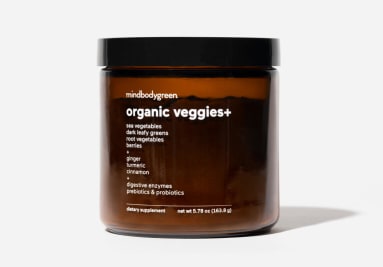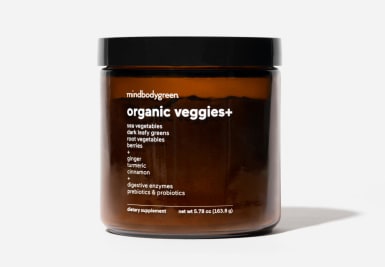A Nutritionist Explains How To Help Your Kids Eat Healthfully (Without Being An Almond Mom)


As a nutritionist and mom, I'm intimately familiar with the tightrope walk of teaching kids to be healthy eaters. Though I try to set appropriate parameters around my three kids' diets, the last thing I ever want to be is an "almond mom."
This TikTok-famous term refers not to a mom who feeds her kids healthy foods like almonds (I'm totally on board with that!) but rather a mom who gives her child only a handful of almonds, telling them too many will make them fat. In other words, it refers to a mom who's entrenched in diet culture.
Advertisement
In my nearly 16 years of parenting, I've tried to help my kids create a healthy relationship with food—not one tinged with doubt, fear, or shame. I've done so because I know the experiences we have with food as kids stay with us in the long term.
"Unfortunately, many childhood food experiences can negatively impact their relationship with food, and this carries on into adulthood," says dietitian and therapist Aleta Storch, M.S., RDN, LMHC, of Wise Heart Nutrition and Wellness. "This is why so many adults struggle with food and eating—we lose the ability to listen to our body, and it is difficult to unlearn what is deeply ingrained in us in order to redevelop this skill."
So what's a well-meaning parent to do to instill healthy habits in kids—without creating a culture of emotionally fraught eating? Try these six tips for setting the nutritious stage:
Start early
From their first bites, little ones are developing a lifelong relationship with food. With young kids, encourage experimentation, offering a wide variety of foods—even ones you yourself aren't familiar with! Meanwhile, try to leave behind the concept of "kid foods" versus "grown-up foods." If your child believes foods like mushrooms and quinoa are only adult territory, it may make them more resistant to more adventurous—and, ultimately, healthier—eating.
Keep healthy foods on hand
Just like adults won't reach for highly processed snacks or sugary drinks if we don't stock them, neither will kids. When grocery shopping, make a point to purchase healthy, convenient foods like fruits and vegetables, whole wheat crackers, nut butters, and low-sugar yogurts. This way, whether you feed your child or they're old enough to feed themselves, there are plenty of options to choose from. Bonus: The more you normalize a diet full of nutritious foods, the more this type of eating will become second nature to your child.
Advertisement
Mix, don't hide
Even before the days of TikTok, plenty of influencers advocated hiding healthy ingredients in "kid-friendly" foods (à la muffins with secret sweet potatoes or meatballs laced with kale). While the intentions behind the stealth veggie movement were surely good, these culinary acrobatics don't actually teach kids to make their own healthy choices. (And they sure make a heckuva lot of work for parents.)
Rather than tricking kids into healthy eating, try mixing nutritious ingredients visibly into well-liked foods. Think bell peppers atop pizza, a scoop of nutrient-rich greens powder for a lovely emerald color in a fruit smoothie, or nachos with black beans.
Advertisement
Offer them a choice
Young people feel empowered when they make their own decisions around food. That's why offering variety can be a game changer. Try framing meal and snack decisions with plenty of choices: "Do you want an apple or a kiwi with your lunch today? Do you want hummus or honey mustard to dip your carrots in?" Questions like these give kids a sense of self-direction, allowing them to embrace healthy foods for themselves.
Let go of food morality
It's easy to veer into black-and-white thinking around food, labeling certain choices as inherently good and others as bad. But this type of food morality sets kids up for a dysfunctional relationship with food.
"Treat all foods as morally equivalent—apples and chocolate are both just a source of carbohydrates—nothing more, nothing less," Storch recommends. "When a food is seen as 'special,' it becomes so much more desirable, making it hard to listen to and honor our body's needs."
Advertisement
Set a healthy example
Finally, don't forget that you are your child's most important model of a healthy relationship with food. If you find yourself frequently grabbing processed convenience foods, yo-yo dieting, or overdoing it on portion sizes, consider the message these behaviors send to your child.
"Bring awareness to and do your own work around your relationship with food. Kids are like sponges, and they pick up on our beliefs and attitudes very easily," Storch says. "Be intentional about leaving diet culture out of the conversation and try modeling intuitive eating for your child. When kids are raised to be intuitive eaters, they are more likely to grow into adults who eat intuitively."

Sarah Garone, NDTR is a licensed nutritionist and freelance health and wellness writer in Mesa, AZ whose work has appeared in numerous publications. After a first career as a college German teacher, health problems led her to pivot her work to the way food impacts wellness. In addition to her writing, Sarah enjoys spending time with her husband and three teenage kids, cooking, running, volunteering at a certified pro-women's healthcare center, and singing in a concert choir.

